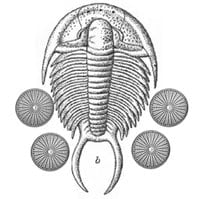Extinct Wheeled Creature Discovered as Ice Recedes
Biologists ecstatic, racing to discovery site from all over the world
Posted: 4/1/2015

From ancient ice in the arctic has emerged an evolutionary marvel: fossil remains of a lost branch from the tree of life. The discovery of the organism, named Wrangelia rota, was published online today in the journal Nature. It appears to have possessed a means of locomotion unique among Earth’s biota: wheels. Measuring approximately 9.5 cm in length and sporting backward pointing spines, the terrestrial roller was probably a carnivore preying on small soft-bodied animals, according to the paper’s lead author, Charlie Darvin. The researchers from Boston University’s Kansas campus speculate that W. rota’s speed allowed it to snatch up unsuspecting prey.
The fossils were discovered in August 2013 on Wrangle Island in the northern Arctic Ocean. Along with the animal’s remains, the authors report finding grooves in the sediment that appear to be tracks along which the extinct organisms moved. The study’s second author, Steven J. Fooled, said in an interview that the wheels appeared to consist of an indurate calcified substance, and were able to freely turn on short boney axles that protruded from the skeleton. The creature had no other appendages. Although the soft tissues are long gone, the wheels were likely covered in rubbery tissue to provide traction. The authors have not ruled out the possibility that the organism represents a symbiotic fusion between a Trilobite-relative and large disc-shaped diatoms.
These animals have no clear taxonomic alignment with any other living or fossil animal group, but appear to be from the Cambrian period and co-occurred with Trilobites. “It appears likely that they went zip when they moved, bop when the stopped, and whirred when they stood still,” said Fooled. He added, “After we found about thirty of forty of the little buggers still intact we started having races on our camp table with what was left of them. There were so many of them and they were so fast, we couldn’t help it. Charlie won three out of five races so he got to be lead author on the paper.”
The fossils were discovered over a broad, relatively flat plane exposed as the ice was receding on the northern shore of Wrangle Island where the researchers were studying the effects of climate change on consumption of spirits. Some fossils were so densely arranged that it was likely they slowed each other’s progress, possibly creating the first ancient traffic jams. One reason the turning appendages on these remarkable animals have not evolved in any other group of life on Earth may be the well-established rule in nature against reinventing the wheel. According to Darvin, “It’s just not done.”
